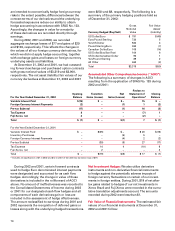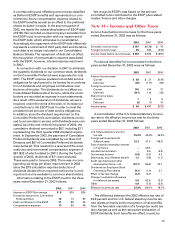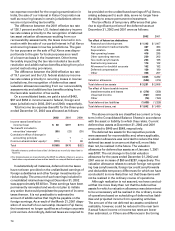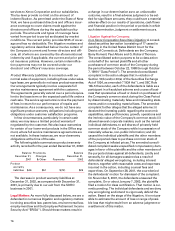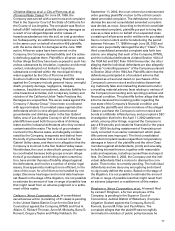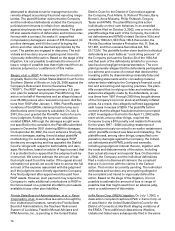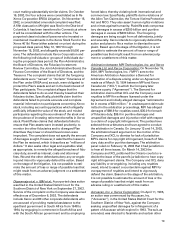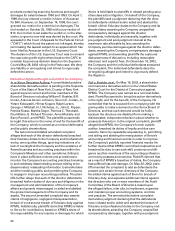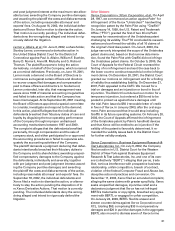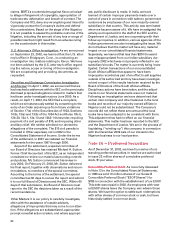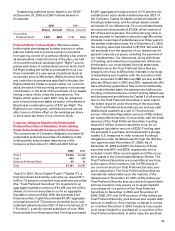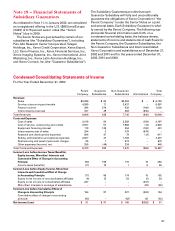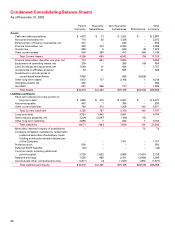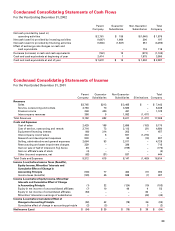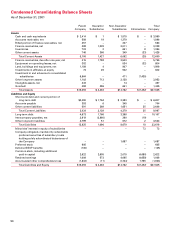Xerox 2002 Annual Report Download - page 82
Download and view the complete annual report
Please find page 82 of the 2002 Xerox annual report below. You can navigate through the pages in the report by either clicking on the pages listed below, or by using the keyword search tool below to find specific information within the annual report.
products containing scanning functions and sought
damages for sales between 1990 and 1993. On April 1,
1998, the jury entered a verdict in favor of Accuscan
for $40. However, on September 14, 1998, the court
granted our motion for a new trial on damages. The
trial ended on October 25, 1999 with a jury verdict of
$10. Our motion to set aside the verdict or, in the alter-
native, to grant a new trial was denied by the court. We
appealed to the Court of Appeals for the Federal Circuit
(“CAFC”) which found the patent not infringed, thereby
terminating the lawsuit subject to an appeal which has
been filed by Accuscan to the U.S. Supreme Court.
The decision of the U.S. Supreme Court was to remand
the case (along with eight others) back to the CAFC to
consider its previous decision based on the Supreme
Court’s May 28, 2002 ruling in the Festo case. We deny
any liability or wrongdoing and intend to vigorously
defend the action.
Derivative Litigation Brought on Behalf of the Company:
In re Xerox Derivative Actions: A consolidated putative
shareholder derivative action is pending in the Supreme
Court of the State of New York, County of New York
against several current and former members of the
Board of Directors including William F. Buehler, B.R.
Inman, Antonia Ax:son Johnson, Vernon E. Jordan, Jr.,
Yotaro Kobayashi, Hilmar Kopper, Ralph Larsen,
George J. Mitchell, N.J. Nicholas, Jr., John E. Pepper,
Patricia Russo, Martha Seger, Thomas C. Theobald,
Paul Allaire, G. Richard Thoman, Anne Mulcahy and
Barry Romeril, and KPMG. The plaintiffs purportedly
brought this action in the name of and for the benefit of
the Company, which is named as a nominal defendant,
and its public shareholders.
The second consolidated amended complaint
alleges that each of the director defendants breached
their fiduciary duties to the Company and its sharehold-
ers by, among other things, ignoring indications of a
lack of oversight at the Company and the existence of
flawed business and accounting practices within the
Company’s Mexican and other operations; failing to
have in place sufficient controls and procedures to
monitor the Company’s accounting practices; knowing-
ly and recklessly disseminating and permitting to be
disseminated, misleading information to shareholders
and the investing public; and permitting the Company
to engage in improper accounting practices. The plain-
tiffs further allege that each of the director defendants
breached his/her duties of due care and diligence in the
management and administration of the Company’s
affairs and grossly mismanaged or aided and abetted
the gross mismanagement of the Company and its
assets. The second amended complaint also asserts
claims of negligence, negligent misrepresentation,
breach of contract and breach of fiduciary duty against
KPMG. Additionally, plaintiffs claim that KPMG is liable
to Xerox for contribution, based on KPMG’s share of
the responsibility for any injuries or damages for which
Xerox is held liable to plaintiffs in related pending secu-
rities class action litigation. On behalf of the Company,
the plaintiffs seek a judgment declaring that the direc-
tor defendants violated and/or aided and abetted the
breach of their fiduciary duties to the Company and its
shareholders; awarding the Company unspecified
compensatory damages against the director
defendants, individually and severally, together with
pre-judgment and post-judgment interest at the
maximum rate allowable by law; awarding the
Company punitive damages against the director defen-
dants; awarding the Company compensatory damages
against KPMG; and awarding plaintiffs the costs and
disbursements of this action, including reasonable
attorneys’ and experts’ fees. On December 16, 2002,
the Company and the individual defendants answered
the complaint. The individual defendants deny the
wrongdoing alleged and intend to vigorously defend
the litigation.
Pall v. Buehler, et al.: On May 16, 2002, a shareholder
commenced a derivative action in the United States
District Court for the District of Connecticut against
KPMG. The Company was named as a nominal defen-
dant. Plaintiff purported to bring this action derivatively
in the right, and for the benefit, of the Company. He
contended that he is excused from complying with the
prerequisite to make a demand on the Xerox Board of
Directors, and that such demand would be futile,
because the directors are disabled from making a
disinterested, independent decision about whether to
prosecute this action. In the original complaint, plaintiff
alleged that KPMG, the Company’s former outside
auditor, breached its duties of loyalty and due care
owed to Xerox by repeatedly acquiescing in, permitting
and aiding and abetting the manipulation of Xerox’s
accounting and financial records in order to improve
the Company’s publicly reported financial results. He
further claimed that KPMG committed malpractice and
breached its duty to use such skill, prudence and dili-
gence as other members of the accounting profession
commonly possess and exercise. Plaintiff claimed that
as a result of KPMG’s breaches of duties, the Company
has suffered loss and damage. On May 29, 2002, plain-
tiff amended the complaint to add as defendants the
present and certain former directors of the Company.
He added claims against each of them for breach of
fiduciary duty, and separate additional claims against
the directors who are or were members of the Audit
Committee of the Board of Directors, based upon
the alleged failure, inter alia, to implement, supervise
and maintain proper accounting systems, controls
and practices. The amended derivative complaint
demands a judgment declaring that the defendants
have violated and/or aided and abetted the breach of
fiduciary and professional duties to the Company and
its shareholders; awarding the Company unspecified
compensatory damages, together with pre-judgment
80


